Norway has pulled the emergency brake to prevent the last private land on Svalbard from falling into the hands of "undesirable actors", reports Norwegian media.
This concerns Søre Fagerfjord in southwestern Svalbard – a mountain area of 60 square kilometers – which is now for sale for the equivalent of 3.4 billion Swedish kronor.
The Norwegian government made a significantly lower bid of around 20 million Swedish kronor last week. Minister of Trade and Industry Cecilie Myrseth (Ap) has previously stated that they are willing to contact the seller to negotiate within realistic frameworks.
The owners have, however, rejected the bid, according to Norwegian NRK.
But the government has, in accordance with Norway's security law, decided to effectively stop the sale to other buyers, as all sales of the land now require approval from the Ministry of Trade and Industry.
The lawyer representing the sellers has previously stated to the news agency AFP that he has received "concrete signs of interest" from potential Chinese buyers who have "shown a genuine interest in the Arctic and Svalbard for a long time".
Svalbard is subject to an unusual legal framework that allows foreign actors to gain a foothold in the region.
Svalbard is located in the North Sea, approximately halfway between the Norwegian mainland and the North Pole.
Over 2,500 people from around 50 countries live in Longyearbyen on the main island of Spitsbergen. In addition, around 350 people live in the Russian mining town of Barentsburg and the ghost town of Pyramiden. Ny-Ålesund and Hornsund are home to researchers.
According to the 1920 Svalbard Treaty, the archipelago belongs to Norway. Other nations that have signed the agreement, however, have access to the islands and can conduct business there. Norwegian legislation applies, and the administration is under the Norwegian Ministry of Justice.
The local administration is led by the governor in Longyearbyen.
Svalbard is demilitarized and may not be used for military purposes. As a result of the Russian military installations on the Kola Peninsula, the Arctic Ocean areas around Svalbard are considered to have great military strategic importance. The possibilities of extracting oil in the Barents Sea also contribute to a great international interest in the area.
Sources: Statistics Norway (SSB), Landguiden/UI.






